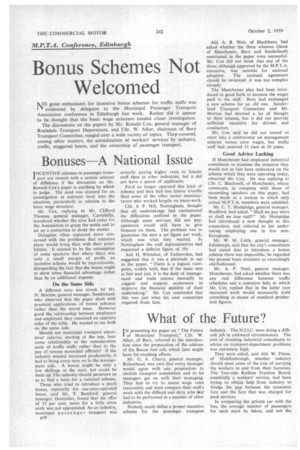What of the Future?
Page 64

If you've noticed an error in this article please click here to report it so we can fix it.
IN presenting his paper on "The Future I of Municipal Transport," Chi.. W. Alker, of Bury, referred to the introduction since the preparation of the address of the Bacon fuel cell, which later might have far-reaching effects.
Mr. G. A. Cherry, general manager. Birkenhead, was sure that every manager would agree with any proposition to abolish transport committees and to let managers get on with their managing. They had to try to assess wage rates reasonably and must compare their staff's work with the difficult and dirty jobs that had to be performed in a number of other industries.
Nobody could define a proper incentive scheme for the passenger transport industry. The N.J.I.C. were doing a difficult job in awkward circumstances. The cost of retaining industrial consultants to advise on transport-department problems was extremely high.
They were asked, said Ald. W. Flynn, of Middlesbrough, whether industry should meet some of the cost of carrying the workers to and from their factories. The Tees-side Railless Traction Board, essentially a workers' service, had been trying to obtain help from industry to bridge the gap between the economic fare and the fare that was charged for peak services.
In comparing the private car with the bus, the average number of passengers for each must be taken, and not the












































































































































































































































